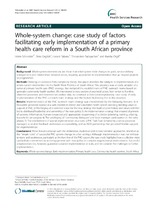Whole-system change: case study of factors facilitating early implementation of a primary health care reform in a South African province
Date
2014Author
Schneider, Helen
English, Rene
Tabana, Hanani
Padayachee, Thesandree
Orgill, Marsha
Metadata
Show full item recordAbstract
BACKGROUND: Whole-system interventions are those that entail system wide changes in goals, service delivery arrangements and relationships between actors, requiring approaches to implementation that go beyond projects or programmes. METHODS: Drawing on concepts from complexity theory, this paper describes the catalysts to implementation of a whole-system intervention in the North West Province of South Africa. This province was an early adopter of a national primary health care (PHC) strategy that included the establishment of PHC outreach teams based on
generalist community health workers. We interviewed a cross section of provincial actors, from senior to frontline, observed processes and reviewed secondary data, to construct a descriptive-explanatory case study of early implementation of the PHC outreach team strategy and the factors facilitating this in the province. RESULTS: Implementation of the PHC outreach team strategy was characterised by the following features: 1) A favourable provincial context of a well established district and sub-district health system and long standing values in support of PHC; 2) The forging of a collective vision for the new strategy that built on prior history and values and that led to distributed leadership and ownership of the new policy; 3) An implementation strategy that ensured alignment of systems (information, human resources) and appropriate sequencing of activities (planning, training, piloting, household campaigns); 4) The privileging of ‘community dialogues’ and local manager participation in the early
phases; 5) The establishment of special implementation structures: a PHC Task Team (chaired by a senior provincial manager) to enable feedback and ensure accountability, and an NGO partnership that provided flexible support for implementation.
CONCLUSIONS: These features resonate with the deliberative, multi-level and context sensitive approaches described as the “simple rules” of successful PHC system change in other settings. Although implementation was not without tensions and weaknesses, particularly at the front-line of the PHC system, the case study highlights how a collective vision can facilitate commitment to and engagement with new policy in complex organisational environments. Successful adoption does not, however, guarantee sustained implementation at scale, and we consider the challenges to further information.

